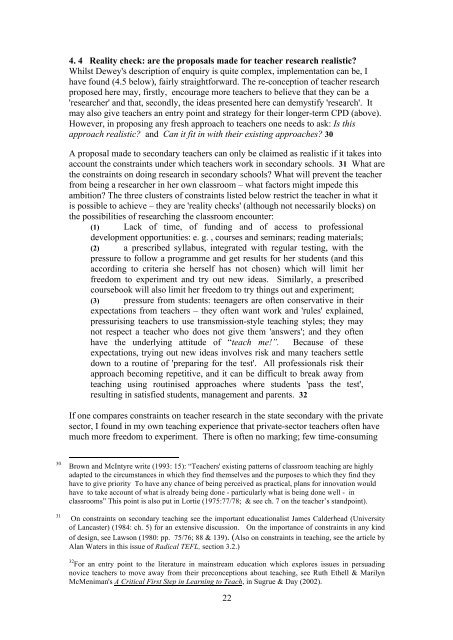RADICAL TEFL
2hqhXJd
2hqhXJd
You also want an ePaper? Increase the reach of your titles
YUMPU automatically turns print PDFs into web optimized ePapers that Google loves.
4. 4 Reality check: are the proposals made for teacher research realistic?<br />
Whilst Dewey's description of enquiry is quite complex, implementation can be, I<br />
have found (4.5 below), fairly straightforward. The re-conception of teacher research<br />
proposed here may, firstly, encourage more teachers to believe that they can be a<br />
'researcher' and that, secondly, the ideas presented here can demystify 'research'. It<br />
may also give teachers an entry point and strategy for their longer-term CPD (above).<br />
However, in proposing any fresh approach to teachers one needs to ask: Is this<br />
approach realistic? and Can it fit in with their existing approaches? 30<br />
A proposal made to secondary teachers can only be claimed as realistic if it takes into<br />
account the constraints under which teachers work in secondary schools. 31 What are<br />
the constraints on doing research in secondary schools? What will prevent the teacher<br />
from being a researcher in her own classroom – what factors might impede this<br />
ambition? The three clusters of constraints listed below restrict the teacher in what it<br />
is possible to achieve – they are 'reality checks' (although not necessarily blocks) on<br />
the possibilities of researching the classroom encounter:<br />
(1) Lack of time, of funding and of access to professional<br />
development opportunities: e. g. , courses and seminars; reading materials;<br />
(2) a prescribed syllabus, integrated with regular testing, with the<br />
pressure to follow a programme and get results for her students (and this<br />
according to criteria she herself has not chosen) which will limit her<br />
freedom to experiment and try out new ideas. Similarly, a prescribed<br />
coursebook will also limit her freedom to try things out and experiment;<br />
(3) pressure from students: teenagers are often conservative in their<br />
expectations from teachers – they often want work and 'rules' explained,<br />
pressurising teachers to use transmission-style teaching styles; they may<br />
not respect a teacher who does not give them 'answers'; and they often<br />
have the underlying attitude of “teach me!”. Because of these<br />
expectations, trying out new ideas involves risk and many teachers settle<br />
down to a routine of 'preparing for the test'. All professionals risk their<br />
approach becoming repetitive, and it can be difficult to break away from<br />
teaching using routinised approaches where students 'pass the test',<br />
resulting in satisfied students, management and parents. 32<br />
If one compares constraints on teacher research in the state secondary with the private<br />
sector, I found in my own teaching experience that private-sector teachers often have<br />
much more freedom to experiment. There is often no marking; few time-consuming<br />
30<br />
31<br />
Brown and McIntyre write (1993: 15): “Teachers' existing patterns of classroom teaching are highly<br />
adapted to the circumstances in which they find themselves and the purposes to which they find they<br />
have to give priority To have any chance of being perceived as practical, plans for innovation would<br />
have to take account of what is already being done - particularly what is being done well - in<br />
classrooms” This point is also put in Lortie (1975:77/78; & see ch. 7 on the teacher’s standpoint).<br />
On constraints on secondary teaching see the important educationalist James Calderhead (University<br />
of Lancaster) (1984: ch. 5) for an extensive discussion. On the importance of constraints in any kind<br />
of design, see Lawson (1980: pp. 75/76; 88 & 139). (Also on constraints in teaching, see the article by<br />
Alan Waters in this issue of Radical <strong>TEFL</strong>, section 3.2.)<br />
32 For an entry point to the literature in mainstream education which explores issues in persuading<br />
novice teachers to move away from their preconceptions about teaching, see Ruth Ethell & Marilyn<br />
McMeniman's A Critical First Step in Learning to Teach, in Sugrue & Day (2002).<br />
22


